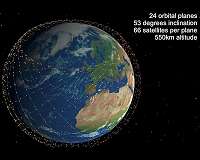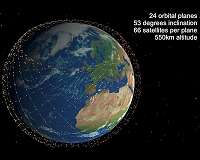Geneva (AFP) May 27, 2021
The launching of thousands of satellites into low Earth orbit by tech billionaire Elon Musk’s SpaceX threatens the “de-facto monopolization” of space, the head of competitor Arianespace Stephane Israel has warned.
Elon Musk’s Starlink constellation project recently received authorization from US regulator the Federal Communications Commission to provide broadband from space and place thousands of satellites lower than previously proposed, angering competitors including Amazon.
SpaceX, which asked the FCC for permission will apply to some 2,800 satellites, plans ultimately to blanket poorly connected and isolated areas of the globe with internet connectivity.
But rivals claim the lower altitude could increase the risk of space collisions and heightened radio interference.
“We want space to remain accessible for human activities… but we refuse a Wild West space. It really is our responsibility to ensure that low orbit (less than 1,000 kilometers or 625 miles) above the Earth is sustainable long-term,” Israel told an UN-sponsored conference in Geneva on sustainable space development goals.
Israel noted that of more than 9,000 satellites sent into orbit since 1957, “SpaceX has already deployed 1,677 satellites for Starlink, which means that today, of all satellites in operation, 35 percent belong to one man — Elon Musk.
“And if you include satellites of more than 50 kilograms, that’s more than 50 percent.”
He added that recent years had seen several collisions, at least two of them involving Starlink satellites, and warned that “very quickly, we could find ourselves in a catastrophic scenario that would render this orbit impractical.”
Israel said there was also “a risk of de-facto monopolization” for Starlink as one of the first firms to set up such a satellite network.
He suggested that was “rather what our competitor is banking on” by securing the FCC’s green light.
The FCC judged in April that deployment at a lower altitude than the 540 to 570 kilometers initially proposed “will improve the experience for users of the SpaceX service, including in often-underserved polar regions”.
It would also enable the satellites to be more speedily removed from orbit which would have “beneficial effects” in terms of reducing space debris, the authority found.
In all, SpaceX has requested FCC authorization for up to 42,000 satellites.
That has put pressure on Arianespace, a joint venture between Airbus and French multinational Safran, to ramp up its own competitiveness for launches — a global market whose value Fortune Business Insights estimated at almost $13 billion in 2019, rising to $26 billion by 2027.
French UN ambassador in Geneva and conference organizer Francois Rivasseau stressed that space had a “vital” role to aid sustainable development.
But he also warned that potential risks could suddenly go from fringe concerns to global problems — pointing to the coronavirus pandemic as a precedent.
– Advertisement –


